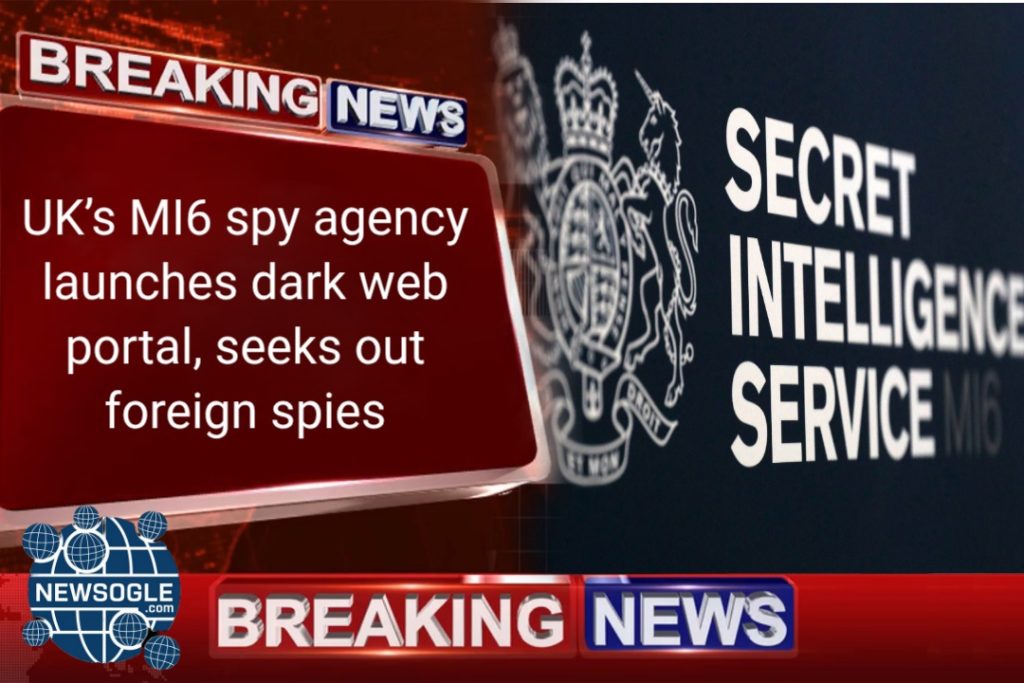
In a move that signals a profound transformation in the world of global intelligence, the United Kingdom’s Secret Intelligence Service (MI6) has announced the launch of a new, secure web portal on the dark web. The platform, named “Silent Courier,” is designed to allow individuals around the world to securely and anonymously provide intelligence to the agency, as well as to offer their services as spies. This unprecedented step, officially announced by outgoing MI6 chief Sir Richard Moore in Istanbul, marks a radical departure from traditional espionage tactics and a full embrace of the digital frontier to counter evolving threats.
The “Silent Courier” portal is built on a sophisticated, highly encrypted infrastructure accessible only via the Tor network, a browser designed for anonymous communication. Its primary purpose, according to statements from MI6, is to reach potential sources of intelligence—from disillusioned foreign government officials and military personnel to individuals with critical knowledge of terrorist groups or organized crime syndicates—who might be unable or unwilling to use conventional means of contact. The use of the dark web is a strategic choice, providing a layer of anonymity that is virtually impossible to achieve through standard internet channels, which are increasingly monitored by state-sponsored surveillance programs.
This initiative is not a mere technological upgrade but a fundamental shift in MI6’s recruitment philosophy. For centuries, espionage has been a game of personal contact, trust, and painstaking cultivation, often requiring agents to operate in high-risk environments to meet with potential human intelligence (HUMINT) sources. The new portal, in contrast, decentralizes this process, allowing individuals in any country to initiate contact without physical risk or the need for a direct meeting. It is, in essence, a digital-age version of a dead drop, a method that allows spies to exchange information in a secure, pre-arranged location. The “Silent Courier” is a virtual dead drop, one that transcends geographical boundaries and hostile surveillance.
Foreign Secretary Yvette Cooper hailed the project as a critical component of the UK’s national security strategy, emphasizing the need to stay “ahead of our adversaries” by leveraging “cutting-edge technology.” The instructions on how to access and use the portal are to be made available on MI6’s official YouTube channel, a move that merges the agency’s clandestine nature with the public-facing accessibility of modern social media. The public nature of the announcement is itself a form of psychological warfare, a signal to adversaries that MI6 is adapting and is willing to use unconventional methods to gain an intelligence advantage. It also serves as a direct message to potential sources: “We are here, and we can protect your anonymity.”
The Strategic Imperative: Why the Dark Web?
The decision to establish a presence on the dark web is not taken lightly. The Tor network, while offering unparalleled anonymity, is also a haven for a variety of illicit activities, from drug trafficking to cybercrime. By entering this space, MI6 is implicitly navigating a complex and dangerous digital environment. However, the strategic benefits far outweigh the risks.
First and foremost, the dark web offers a solution to the problem of state-sponsored surveillance. In authoritarian regimes and countries with highly restrictive internet controls, every email, every phone call, and every web search can be monitored. A potential informant in such a country would face immense risk in trying to contact a foreign intelligence agency through conventional channels. The dark web, by obscuring the user’s IP address and routing their traffic through a series of encrypted relays, makes it extremely difficult to trace the origin of a communication. For a person with sensitive information, this level of anonymity is a prerequisite for making contact.
Secondly, the dark web allows MI6 to cast a wider net. The traditional spy agency model relies on a relatively small number of highly trained case officers operating on the ground. This new portal allows MI6 to reach a global audience, tapping into a vast pool of potential sources who may have information of value but who would never have come into contact with a British intelligence officer. This includes not only government insiders but also researchers, scientists, and even hackers who may have unique knowledge that could be critical to national security.
Thirdly, the portal itself can be used to test the authenticity of a potential source. By requiring a prospective informant to navigate the dark web and follow specific, verifiable instructions, MI6 can filter out a significant number of time-wasters and impostors. The act of successfully reaching the portal is, in a way, a test of competence and sincerity. The agency can then use a series of digital exchanges to build a profile of the individual before committing any physical resources.
Echoes of the Past, Glimpses of the Future
While the use of the dark web is a new chapter in intelligence history, the underlying principle is as old as espionage itself: finding individuals who are willing to betray their secrets for a cause, for money, or out of a sense of grievance. The new technology simply modernizes the communication channel. It is a move that echoes the Cold War era’s use of clandestine meetings in a world of pervasive surveillance, a time when spies had to rely on elaborate protocols to avoid detection. Now, the digital realm has become the new geopolitical battlefield.
This strategic shift is not unique to MI6. The US Central Intelligence Agency (CIA) launched a similar portal in 2023, and it is a known fact that other intelligence services are exploring or have already adopted similar methods. This indicates a broader consensus among Western intelligence agencies that the digital domain, especially its most anonymous corners, is now a crucial arena for human intelligence gathering. The use of a dark web portal is a recognition that the “five eyes” alliance—the intelligence-sharing partnership between the UK, US, Canada, Australia, and New Zealand—must innovate together to maintain its technological edge over adversaries.
The launch of “Silent Courier” also underscores a change in the nature of intelligence itself. The digital age has led to an explosion of information, and the most valuable commodity is no longer just state secrets but any unique data that can provide a strategic advantage. This includes information on emerging technologies, critical infrastructure vulnerabilities, and the internal workings of non-state actors like terrorist groups. A new generation of spies will be less about the thrill of a car chase and more about the quiet, meticulous work of sifting through digital data and establishing trust with anonymous sources online.
The Perils and Ethical Quagmire
Despite the strategic advantages, the use of the dark web for recruitment and intelligence gathering comes with significant risks. The first and most obvious is the security of the portal itself. While the Tor network provides a high degree of anonymity, it is not impervious to attack. Adversaries, including state-sponsored hackers, will undoubtedly attempt to penetrate the “Silent Courier” portal to identify sources, plant disinformation, or even turn the portal against its creators. MI6 will have to maintain a constant, high-level defense against sophisticated cyber threats.
There are also significant ethical considerations. By creating a portal for anonymous sources, MI6 is potentially encouraging individuals in foreign countries to engage in activities that could lead to their imprisonment, torture, or even death. While the agency has a duty to protect its sources, the digital world is a treacherous place, and the risk of a security breach, no matter how small, is ever-present. This raises questions about the moral responsibility of an intelligence agency to the individuals it recruits. Is it ethical to encourage someone to take on such risks, even if the intelligence they provide is crucial to national security?
Furthermore, the dark web is a hotbed of disinformation. Adversaries could use the “Silent Courier” portal to feed MI6 false or misleading information, a classic tactic of counterintelligence. An enemy intelligence service could create a fake persona with fabricated information to drain MI6’s resources, or, more dangerously, to mislead the agency into taking actions that are detrimental to its interests. This means that while the portal may provide a means of anonymous contact, the process of verifying a source’s authenticity and the reliability of their intelligence will be more critical and challenging than ever before.
Expert Reaction and the Future of Espionage
The intelligence community has largely praised MI6’s move as a necessary and innovative step. Cybersecurity expert and former intelligence analyst Dr. Aris Thorne commented that “This is the inevitable evolution of espionage. The traditional model of espionage is becoming obsolete in a world where governments can monitor every communication. This is a game-changer, and it will force other agencies to follow suit if they want to remain relevant.”
However, civil liberties advocates have expressed concern. Sarah Chen, a digital rights campaigner, warned that “while this may be framed as a tool for national security, it also normalizes government presence on a part of the internet that was created to protect privacy. It’s a slippery slope. What starts as a portal for spies could morph into a tool for broader, untraceable surveillance.”
In conclusion, the launch of the “Silent Courier” portal represents a pivotal moment in the history of espionage. It is a bold, high-stakes gamble by MI6 that could redefine how human intelligence is gathered in the 21st century. It is a recognition that the spy of the future may be less of a shadowy figure in a trench coat and more of a tech-savvy individual sitting at a keyboard in an anonymous location. The success or failure of this initiative will be a powerful testament to whether the world’s oldest profession can truly adapt to the brave new digital world. The move is a clear signal: the war for secrets has moved to the darkest corners of the internet.






